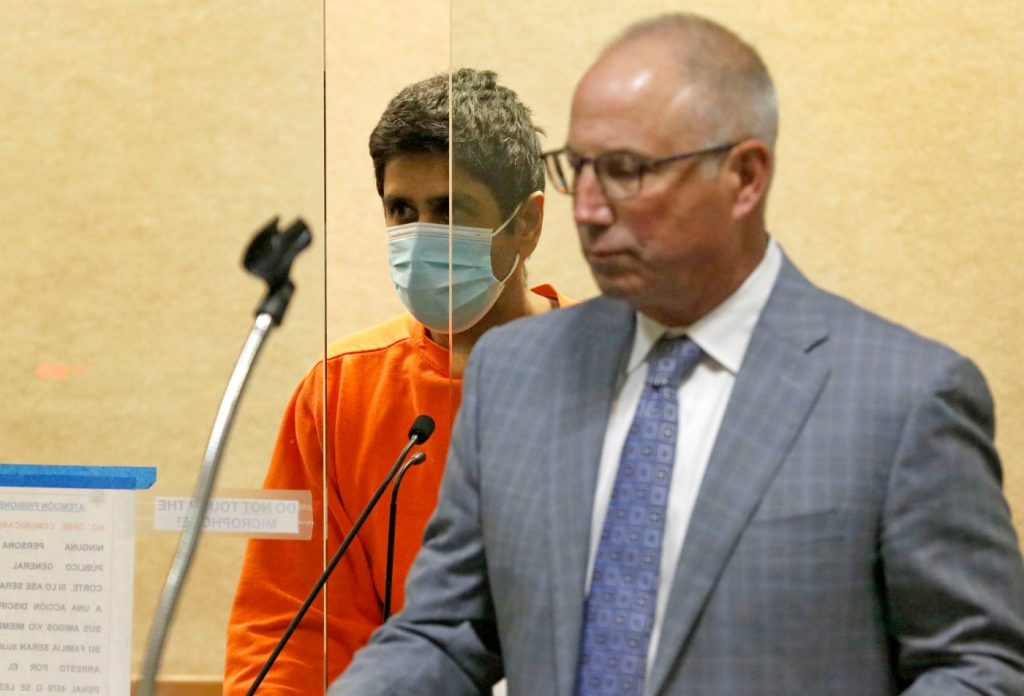An attorney for the Pasadena radiologist accused of driving his family off a cliff near Devil’s Slide pleaded Friday for him to be released from jail into a mental health diversion program, even as prosecutors called the doctor “a danger to the community.”
The request — and prosecutors’ impassioned misgivings about it — capped a three-day hearing to determine whether Patel should be admitted into a program that would see all of his criminal charges dismissed, if he successfully completes two years of mental health treatment. The program was created by state lawmakers to reduce the number of mentally ill people locked up behind bars across the state, and to ensure they instead receive treatment for the conditions that led to their arrest.
Patel, 42, was charged in early 2023 with three counts of attempted murder after prosecutors said he drove his family’s Tesla off Highway 1 and down a 330-foot cliff onto a rocky beach north of Half Moon Bay. Authorities claimed the crash was a desperate bid by Patel attempt to kill his family, after the doctor became overwhelmed with delusions about his children — then ages 4 and 7 — from being forced into sex trafficking by some unknown, shadowy kidnappers.
During a hearing Friday, Patel’s attorney, Joshua Bentley, acknowledged the “incredibly serious” nature of the charges. Yet he stressed that Patel was a perfect candidate for the program, given how Patel wanted to be treated for his mental illness, and that his symptoms are expected to respond to psychologists’ plans for therapy and medication.
“Mr. Patel is a good man,” said Bentley, adding that the 47 letters of support written to the judge were signs that he was “beloved by his community.”
If released, Patel would be treated by a team of psychologists and psychiatrists led by James Armontrout, program director of the Stanford Forensic Psychiatry Fellowship. The psychologist was one of several to diagnose Patel with major depressive disorder, with psychotic features, since the crash.
Under the plan, Patel would spend at least two months in an intensive outpatient program provided by El Camino Health, while also attending weekly therapy sessions with at least two clinicians. In addition, he would be outfitted with a GPS monitoring device, barred from driving and largely confined to San Mateo County. He also would not be able to practice medicine.
“Not one witness came in to testify that Mr. Patel poses a risk of danger to society,” Bentley added, stressing that the doctor “is a decent human being, with zero criminal history.”
Yet prosecutors on Friday questioned whether Patel’s treatment plan focused on the correct diagnosis. Dominique Davis, a San Mateo County deputy district attorney, zeroed in on testimony from a psychologist who concluded just days before the hearing began in mid-April that Patel instead suffered from schizoaffective disorder. The new diagnosis by psychologist Yan Chan raised concerns about Patel’s release, should the radiologist not be prescribed the type of anti-psychotic medications that he stopped taking a year ago.
On Friday, Davis pilloried a psychologist, Mark Patterson, who earlier recommended Patel for release despite not speaking to the his wife — suggesting that “he has shown a lack of credibility, and he’s shown a disinterest in getting this right.” And she questioned Armontrout’s ability to oversee Patel’s care, given that he’s “an academic” who has never personally overseen anyone enrolled in such a diversion program.
“What is most frightening is no one saw this coming,” Davis said. That’s particularly troubling, Davis added, seeing as how Patel “is able to mask his symptoms,” which “increases his danger exponentially.”
“The bottom line is with mental health diversion, we just don’t have the ability to act in time” should Patel once again become deluded and suffer a psychotic break, Davis said.
The hearing — conducted over two full days of testimony in April and early May — painted a new and complicated picture of the Southern California radiologist.
Immediately after the crash, his wife told first responders that her husband was “depressed” and that “he purposely drove off” the cliff. Yet Patel, who has pleaded not guilty, initially claimed the family’s Tesla had been experiencing tire issues that may have caused the crash that left most of his family hospitalized with serious injuries.
During the hearing, however, psychologists testified that Patel appeared to become increasingly delusional in the days before the crash. He heard footsteps, and some of those delusions revolved around the war in Ukraine and the U.S. fentanyl crisis. Some testimony even suggested that he suffered from ruminations and paranoia as far back as two years before the crash.
Earlier this month, Patel’s wife begged for his release and stressed that “we need him in our life,” because “we’re not a family without him.” She emphasized that she “will not hesitate to seek help when needed” if Patel began showing signs of once again becoming mentally unstable.
“The health and safety of my family is of paramount importance,” said Neha Patel, who was not identified by name in court and addressed the courtroom via a video call.
San Mateo County Superior Court Judge Susan Jakubowski is expected to issue her ruling on June 10.


